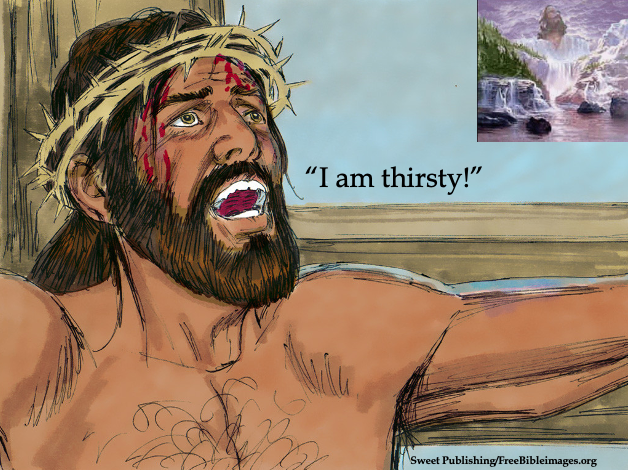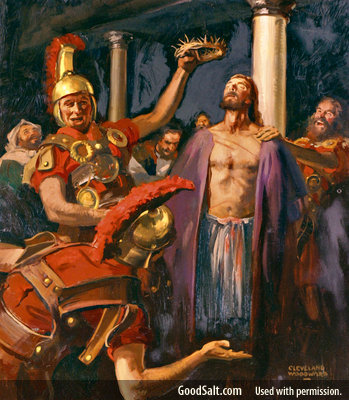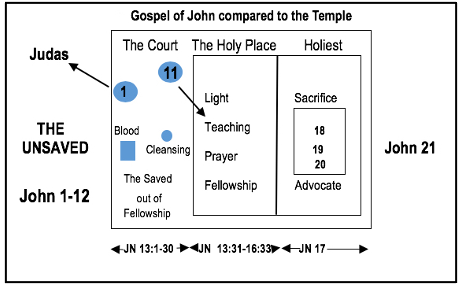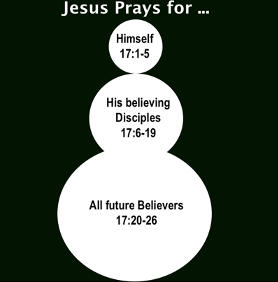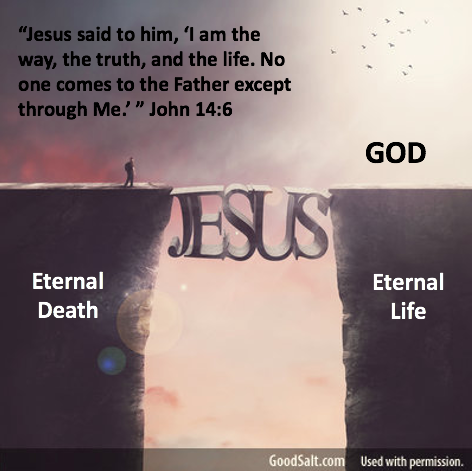“After this, Jesus, knowing that all things were now accomplished, that the Scripture might be fulfilled, said, ‘I thirst!’ ” John 19:28
During one of my missions trips to the northern Philippines in 2015, I had to walk with my translator all day to share the gospel at three remote schools in the mountains of Kalinga province. The day began with swimming across a raging river and then traversing over a mudslide on a steep mountainside. Before we arrived at our first school four hours later, my clothes were already drenched with sweat from the extreme exertion in the high humidity and altitude in this tropical climate.
When we finished preaching the gospel at the first school, we then had to cross several streams and go up and down several slippery and muddy slopes to arrive at our second school where we shared the gospel with forty-nine students and two teachers. We then ate our own snacks and I drank some of my water in a shelter on the school grounds. I was getting low on water at this point because of the strenuous hikes so I tried to conserve what little I had left. I had underestimated the amount of water I would need during the day because I assumed there would be purified water at the schools. But I was wrong.
To get to our last school, we had to walk down the mountainside to a swinging bridge and then follow the river for a while before climbing a steep trail. At this point my legs were starting to cramp severely due to the loss of fluids and electrolytes. I had to stop occasionally to try to stretch my cramping muscles. As we started climbing up the rice terrace walls I became concerned about having muscle cramps and falling off the terrace wall on the steep mountain slopes. A few months earlier on a similar hike in Kalinga, I had fallen off a slippery rice terrace wall in the rain and cracked two ribs and sprained my knee. But during this trip, the biggest challenge was dealing with my ravaging thirst. With each step up the mountain, I kept thinking about how refreshing it would be to drink a cold glass of water.
About forty-five minutes later we arrived at our last school and shared the gospel with forty-five students, all of whom said they were now believing in Jesus for His gift of eternal life. The teachers were very thankful we would work so hard to come all the way to their school. The male teacher invited us to his home to have coffee and snacks. While resting there, he had his wife pour the remainder of their coffee in a water bottle for me to drink because I drank the last of my water and there was no purified water between our current location and the next village. I was so parched that drinking coffee for my thirst sounded better than going without any liquid at this point, even though caffeine is a diuretic. I learned later that even caffeinated beverages such as coffee have a net hydrating effect.
On our return to civilization, we had to hike up a steep mountainside covered with rice terrace walls to a dirt road with many switch backs going up the mountainside to the main road. As we continued to hike up the mountainside, I longed for several liters of gatorade. My mouth and throat were parched. An hour and a half later, we finally arrived at a village where we thoroughly enjoyed purified water, juice, and a delicious meal. Never before or since had I experienced such a ravaging thirst.
But the thirst I experienced in Kalinga is pale compared to the thirst of crucifixion because “crucifixion is a long slow process of dehydration.” 1 Think about how much bodily fluid Jesus has lost since His last drink of wine at the Lord’s Supper. In Gethsemane Jesus sweat as it were great drops of blood; He sweat as He endured His arrest and His trials before Annas and Caiaphas; He sweat as He spent the night in a dungeon, with a new series of trials in the morning; His flogging and being forced to carry His crossbeam would have drained the fluids from His body. And now for six hours He had hung on the cross without consuming any liquids. 2
We then read, “After this, Jesus, knowing that all things were now accomplished, that the Scripture might be fulfilled, said, ‘I thirst!’ ” (John 19:28). We learn several things from this verse. First, we see that the word teleioō is used twice in this verse. “Jesus, knowing that all things were now accomplished [tetelestai], that the Scripture might be fulfilled [teleiōthe], said, ‘I thirst!’ ” This is the same word translated “It is finished” [tetelestai]in John 19:30. “We might paraphrase in this way: Since Jesus knew that all things were finished, in order that the OT Scripture might be finished… He said, ‘It is finished!’ Clearly John is emphasizing that Jesus successfully completed all that He had been sent to do.” 3
Secondly, we see that when Jesus said, “I am thirsty,” He was consciously fulfilling the Old Testament Scripture in Psalm 69:21, “And for my thirst they gave me vinegar to drink.” Jesus had not been given any vinegar yet, so He called out that He was thirsty so He could fulfill this prophecy. John informs us that this verse was fulfilled when, “A vessel full of sour wine was sitting there; and they filled a sponge with sour wine, put it on hyssop, and put it to His mouth.” (John 19:29).
“Hyssop was the very plant used to brush lamb’s blood on the doorposts during the Passover (see Exod 12:21-23). As the apostle Paul says, ‘Christ our Passover lamb has been sacrificed’ (1 Cor 5:7).” 4 Jesus, the innocent Passover Lamb of God, had become thirsty to save us from an eternal thirst.
I find this to be amazing. Here is Jesus just minutes away from death, and He remembers that a Messianic prophecy needs to be fulfilled. Why is Jesus so determined to fulfill prophecy? One reason is because He knows we are prone to doubt. 5 When we see Him suffering to this extent, we may question if He is truly the Messiah-God. We may conclude that God is not in control.
Do we realize that Jesus fulfilled over three hundred distinct prophecies in the Old Testament at His First Coming to earth? The mathematical probability of all these prophecies being fulfilled in the life of one man is 1/840,000,000,000,000,000,000,000,000,000,000,000,000,000,000,000,000,000,000,000,000,000,000,000,000,000,000,000,000,000,000,000,000 (That’s ninety-seven zeroes!) 6 A partial list of those prophecies include:
– The betrayal by a familiar friend (Psalm 41:9; cf. John 13:18, 26).
– The forsaking of the disciples through being offended at Him (Psalm 31:11; cf. Matthew 26:56b).
– The false accusations (Psalm 35:11; cf. Mark 14:56-58).
– The silence before His judges (Isaiah 53:7; cf. Mark 14:51; 15:3, 5 ).
– Being proven innocent (Isaiah 53:9 cf. John 18:38; 19:4, 6).
– Being included with sinners (Isaiah 53:12; cf. Matthew 27:38; Mark 15:27-28).
– The piercing of His hands and feet when crucified (Psalm 22:16; John 19:37; 20:25-27).
– The mockery of onlookers (Psalm 109:25; Luke 23:35).
– The taunt of being unable to deliver Himself (Psalm 22:7-8; Matthew 27:39-44).
– The casting of lots for His garments (Psalm 22:18; cf. Matthew 27:35; John 19:23-24).
– The prayer for His enemies (Isaiah 53:12; cf. Luke 23:34).
– The yielding of His spirit into the hands of His Father (Psalm 31:5; cf. Luke 23:46).
– His bones are not broken (Psalm 34:20; cf. John 19:32-36).
– The burial in a rich man’s tomb (Isaiah 53:9; cf. Matthew 27:57-60). 7
Jesus did not say, “I am thirsty,” just so He could quench His physical thirst. He did this because He knew this prophecy had to be fulfilled. And it was.
A third thing we learn when Jesus said, “I am thirsty,” is that Jesus was fully human. “As God He could say, ‘I tell you the truth … before Abraham was born, I am!’ (John 8:58). As man He could say, ‘I am thirsty’ (John 19:28). God the Father does not thirst; angels do not thirst. This was the thirst of a dying man.” 8
Christ’s humanity was also seen when He was weary in Samaria (John 4:6), disturbed in Nazareth (Mark 6:6), angry in the temple (John 2:15), sleepy in the boat on the Sea of Galilee (Mark 4:38), sad at the tomb of Lazarus (John 11:35), and hungry in the wilderness (Matthew 4:20).
Why did Jesus endure all these experiences? Because He knew we would be thirsty, weary, disturbed, angry, sleepy, sad, and hungry. What this teaches us is that Christ understands how we feel. 9
The Bible tells us, “15 For we do not have a High Priest who cannot sympathize with our weaknesses, but was in all points tempted as we are, yet without sin. 16 Let us therefore come boldly to the throne of grace, that we may obtain mercy and find grace to help in time of need.” (Hebrews 4:15-16). We can be confident that whatever we are experiencing, Jesus has also experienced it and more.
Are you in physical pain? Remember Christ’s burning thirst. Have you been rejected? Jesus was rejected by the world and His own Jewish people (John 1:10-11). Have you been put to shame? Christ was crucified while almost naked. Have you been abandoned? Christ was forsaken by His own disciples and worse – by His heavenly Father (Matthew 26:56b; 27:46). 10 Why? So He could understand us when we face similar things. And because He understands us, we can come to Him with confidence.
The most important lesson we learn from these verses is that JESUS BECAME THIRSTY TO SAVE US FROM AN ETERNAL THIRST (JOHN 19:28-29). This is the most amazing thing of all – that the Water of Life would become thirsty. And we are not talking about physical thirst. We areE talking about spiritual thirst.
All people are born with a spiritual thirst for God. The Bible tells us, “He has put eternity in their hearts.” (Ecclesiastes 3:11). He has placed a thirst in our hearts for something eternal. And only God can quench this thirst. But people often try to quench this spiritual thirst through some other means such as achievements, alcohol, money, possessions, power, and sex. Others may exist on medication because they cannot bear the pain of their own emptiness. Some people pursue pleasure, trying to medicate the brokenness in their lives.
The Bible refers to these practices in Jeremiah 2:13: “For My people have committed two evils: They have forsaken Me, the fountain of living waters, and hewn themselves cisterns—broken cisterns that can hold no water.” Instead of turning to GodWho is like a “fountain of living waters” that provides for our deepest needs and longings (Jeremiah 2:13a; cf. Psalm 36:9; John 4:10-14; Revelation 21:6), we turn away from Him and dig broken cisterns that can hold no water – much less provide it (Jeremiah 2:13b).
The issue is not whether we thirst – for we all do – the real issue is how long will we thirst? Jesus answers that question in a story He told about a rich man and a poor man named Lazarus. When both men died, Lazarus was escorted by angels to a place of blessing called “Abraham’s bosom” (Luke 16:22) and the rich man went to a place of torment in Hades (Luke 16:23). The rich man “cried and said, ‘Father Abraham, have mercy on me, and send Lazarus that he may dip the tip of his finger in water and cool my tongue; for I am tormented in this flame.’” (Luke 16:24).
“What do people in hades (which will eventually be thrown into hell) say? Tormented in the fire they cry out, ‘I am thirsty!’” 11 As Matthew Henry put it, “The torments of hell are represented by a violent thirst, in the complaint of the rich man who begged for a drop of water to cool his tongue. To that everlasting thirst we had all been condemned, if Christ had not suffered on the cross.” 12
Lutzer says, “Hell is remembering the Living Water we could have enjoyed on earth that would have taken us to heaven. Hell is a lake of fire, a place of endless, unquenchable thirst.” 13
Thank God that Jesus endured the agonizing thirst of His soul when the sins of the world were placed upon Him as He hung on that cross so we could drink His living water that quenches our thirst for eternal life forever. This Jesus, Who is now thirsty on the cross, said to a Samaritan woman at a well earlier in His ministry, “10 If you knew the gift of God, and who it is who says to you, ‘Give Me a drink,’ you would have asked Him, and He would have given you living water… 14 whoever drinks of the water that I shall give him will never thirst. But the water that I shall give him will become in him a fountain of water springing up into everlasting life.” (John 4:10, 14).
Christ became thirsty on the cross so you could quench your eternal thirst. The word “drink” means to “believe.” Jesus said, “I am the bread of life. He who comes to Me shall never hunger, and he who believes in Me shall never thirst.” (John 6:35). “To drink” means “to believe” – because both drinking and believing permanently quench our spiritual thirst. One drink of Jesus’ living water, one act of faith in Jesus Christ alone for His gift of everlasting life will quench your spiritual thirst forever. Why? Because when we believe in Jesus alone for His free gift of eternal life, He digs a well in our soul that gushes “up into everlasting life” and never runs dry (John 4:14). Have you taken that drink? Have you believed in Christ alone for His gift of everlasting life? If so, you will “never thirst” for eternal life again.
The Bible tells us that those who believe in Jesus will be taken to heaven one day where “they shall neither hunger anymore nor thirst anymore; the sun shall not strike them, nor any heat; for the Lamb who is in the midst of the throne will shepherd them and lead them to living fountains of waters. And God will wipe away every tear from their eyes.” (Revelation 7:16-17).
It is no surprise that in the last chapter of the Bible we read, “And the Spirit and the bride say, ‘Come!’ And let him who hears say, ‘Come!’ And let him who thirsts come. Whoever desires, let him take the water of life freely.” (Revelation 22:17).
“Those who come to the One who was once thirsty need never thirst again.” 14 If you have never come to Christ in faith for His gift of everlasting life, you can do so now. Simply take Jesus at His Word when He says, “Whoever believes in Him should not perish but have everlasting life.” (John 3:16). If you now believe in Christ for His gift of everlasting life, you can tell Him this through prayer.
Prayer: Loving Lord Jesus, thank You for crying out on the cross, “I am thirsty,” so You could fulfill the remaining Bible prophecy concerning Your death and prove You were the promised Messiah-God. I now realize that You became thirsty on the cross so I could be saved forever from an eternal thirst in hell. As best I know how, I now believe in You, Jesus, to give me everlasting life which can never be lost. Thank You that I will never thirst for eternal life again. Thank You for digging a well in the depths of my soul that bubbles up into a fountain of everlasting life which never runs dry. Please show me how to know You more and enjoy Your living waters. In Your precious name, I pray, Lord Jesus. Amen.
ENDNOTES:
1. Erwin W. Lutzer, Cries from the Cross: A Journey Into the Heart of Jesus (Moody Publishers, Kindle Edition, 2002), pg. 105 cites Philip Graham Ryken, “Human After All,” in The Heart of the Cross, James Montgomery Boice and Philip Graham Ryken (Wheaton, Ill.: Crossway, 1999), pg. 37.
2. Erwin W. Lutzer, Cries from the Cross, pp. 105-106.
3. Robert Wilkin; J. Bond; Gary Derickson; Brad Doskocil; Zane Hodges; Dwight Hunt; Shawn Leach. The Grace New Testament Commentary: Revised Edition (Grace Evangelical Society, Kindle Edition, 2019), pg. 559.
4. Tony Evans, CSB Bibles by Holman. The Tony Evans Bible Commentary (B & H Publishing Group, Kindle Edition, 2019), pg. 1825; cf. Edwin A. Blum, The Bible Knowledge Commentary Gospels, Editors John F. Walvoord and Roy B. Zuck (David C Cook, 2018 Kindle Edition), pg. 692.
5. Max Lucado, He Chose The Nails (Nashville: Word Publishing, 2000), pg. 95.
6. Ibid., pg. 96, 154 cites William Hendriksen, Exposition of the Gospel According to John, of New Testament Commentary (Grand Rapids: Baker Book House, 1953), pg. 431.
7. Adapted from Max Lucado, He Chose The Nails, pp. 95-96.
8. Erwin W. Lutzer, Cries from the Cross, pg. 107.
9. Adapted from Max Lucado, He Chose The Nails, pp. 92-93.
10. Adapted from Erwin W. Lutzer, Cries from the Cross, pp. 112-113.
11. Ibid., pg. 115.
12. Ibid cites Matthew Henry quoted in Philip Graham Ryken, “Human After All,” in The Heart of the Cross, pg. 42.
13. Erwin W. Lutzer, Cries from the Cross, pg. 115.
14. Ibid., pg. 118.

